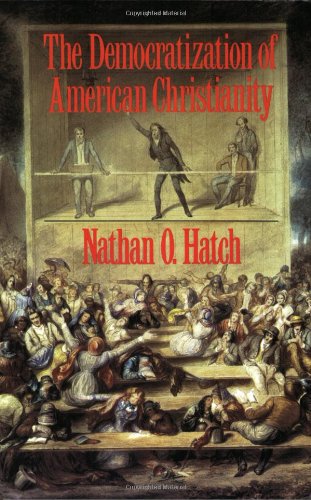A Brief Book Summary from Books at a Glance
Author Notes
Nathan O. Hatch is professor of history and vice president for Graduate Studies and Research at the University of Notre Dame.
Table of Contents
Introduction: Democracy and Christianity
The Crisis of Authority in Popular Culture
Storming Heaven by the Back Door
Thundering Legions
The Sovereign Audience
the Right to Think for Oneself
Upward Aspiration and Democratic Dissent
Epilogue: the Recurring Populist Impulse in American Christianity
Redefining the Great Awakening: A Note on the study of Christianity in the Early Republic
Appendix: A Sampling of Anticlerical and Anti-Calvinist Christian Verse
Summary
Chapter One: Introduction: Democracy and Christianity
The period of American history covered in this book spans from 1780 to 1845, with a focus on the intense growth and passion of popular protestant movements that flowered outside of traditional denominations. In particular, Hatch analyzes how the democratic impulses of the American political experiment and the vast American landscape inspired popular Protestantism to cast off the need for an educated clergy or for denominational control.
Central to this story is the emergence of charismatic and dedicated religious leaders who operated outside of normal ecclesiastical channels and drew their appeal and authority directly from the people. Attempts to explain the success of various religious movements during this period are difficult given its social volatility and mobility; but a focus on the writings, actions, and itineraries of these charismatic leaders provides key insights and a measure of control to the analysis.
Hatch will survey five of the mass religious movements that flowered during this time: Methodism, Baptists, the black church, the Christian movement, and Mormonism. While the ecclesiastic polity of these five groups developed in very different ways, Hatch sees three common features to each. First, “they denied the age-old distinction that set the clergy apart as a separate order of men.” Second, “these movement empowered ordinary people by taking their deepest spiritual impulses at face value rather than subjecting them to the scrutiny of orthodox doctrine.” This point led to an opening to individual visions and expectations of supernatural phenomena. Thirdly, the success of the American Revolution led to a religious optimism—even millenarianism—that often produced some very undemocratic tendencies. For instance, the explosion of charismatic leadership that made direct appeal to ordinary folk often created a starry-eyed authoritarian devotion to such leaders.
In the closing sections of the chapter, Hatch states that a recurring element in his book with be “the unintended results of people’s actions. Attempting to erase the differences between leaders and followers, Americans opened the door to religious demagogues.” Similarly, “the quest for unity that drive people to discard formal theology for the Scriptures drove them further asunder.” Despite these results, there can be no question that the heritage of religious democratization in the early republic brought Christian sentiment and commitment in America to a degree unknown anywhere else in the world up to that time.
Chapter Two: The Crisis of Authority in Popular Culture
The chapter opens with an account of representatives of the traditional New England orthodoxy—such as Lyman Beecher and Timothy Dwight—both celebrating the expansion of theological education but also bitterly lamenting the aggressive expansion of a populist brand of ministry that operated outside of standard channels and, indeed, actively opposed those channels. A far greater source of conflict in the early republic, Hatch avers, was not over the disestablishment of religion, but over the nature of religious authority itself. It was increasingly difficult for ministers cast in the mold of New England orthodoxy, with its decorum and educated assumptions, to compete with the rising populist passion of itinerant preachers who made their appeals directly to the conscience and will of the people.
Hatch turns to how the American Revolution itself provided the theoretical ammunition to this populist upsurge. The Jeffersonian ideals of decentralization, equalization, and localism appeared to be confirmed by the success of the Revolution, and many people began actively questioning any and all of the old hierarchies of the pre-revolutionary period, including the hierarchy of the educated clerical class. The values, customs, and opinions of common folks became increasingly more valued than the long-held views of the artificial, privileged and invested classes. As one spokesman for the new populism stated, “it is degrading to an American to take anyone on trust.” The knowledge of the past became suspect, and this distrust carried over in the areas of law, medicine, and eventually pastoral ministry.
Hatch seeks to correct an oversimplification often made concerning the history of the early republic that envisions a conflict between Enlightenment free-thought and Evangelical fervor. In point of fact, the new populism embraced the rhetoric and ideals of the Enlightenment and pressed them into the service of evangelical causes. No one better demonstrates this than the very popular, world-traveling, Methodist minister Lorenzo Dow who came from humble origins. As Hatch summarizes, “[Dow] was able to depict his times as an ‘Age of Inquiry,’ in which individuals had to think for themselves and take matters into their own hands; and as an ‘Age of Wonders,’ in which the divine continues to permeate everyday life.”
Dow spoke for many upcoming leaders in the Second Great Awakening who, growing disillusioned with the conflicting dogmas of established churches, trusted in their own abilities and in supernatural guidance to interpret the Bible for themselves and. . .
[To continue reading this summary, please see below....]The remainder of this article is premium content. Become a member to continue reading.
Already have an account? Sign In
